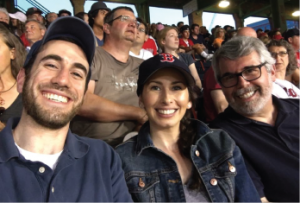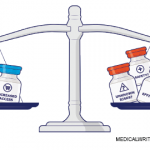Maybe the person most surprised that Erin Arnold, MD, FACR, became a rheumatologist was her father, recently retired rheumatologist William Arnold, MD, FACP, MACR. No doubt, though, that the person most supportive was the same guy.
“As a new doctor, to have somebody there that is by your side that you know is going to support you, beyond because of what they think of as your capabilities as a physician, but because they are so entrenched in who you are as a person, is really a wonderful confidence booster and an incredible foundation to start a new career,” Erin says. “to have somebody you can walk up to and say, ‘Here’s an X-ray. Which hand is the left hand, and which hand is the right hand?’—simple stuff like that when you are a brand new attending—is really important.”
The pair worked so well together for years at a large practice that three years ago, they joined a father-and-son team to open Orthopaedics and Rheumatology of the North Shore, in Skokie, Ill.
The Drs. Arnold share similar diagnostic styles, a common appreciation for cutting-edge treatments and a desire to use the best information at hand to solve the mysteries so often presented by patients.
“Over the last three years, we adopted the same style of practice,” says the elder Arnold, who retired last year. “And that’s really important. We use the same measurement techniques. We use the same laboratory information. Our decision making was in many ways so parallel that our patients, once they would switch to Erin, would see she used the same parameters as I did to make decisions. Not arbitrary, but objective findings.”
A fun quirk of the new practice the Arnolds started a few years ago was that Erin and the son of the other practitioner were technically the bosses. But she was raised better than to make that an issue, and William freely admits that spending the last few years of his career working hand in hand with his daughter was amazing.
“It is really difficult for fathers and daughters to have a long-term relationship that is interactive,” he says. “The usual interaction on a significant level is between the mother and the daughter. They have a bond that is indescribable. It is just so satisfying to be able to talk to my daughter on that level. It’s beyond belief.”
Dr. Zamore says. ‘It’s one of the reasons you go into rheumatology—because you like the people.’
‘Sharing … Things That Our Family Does’

Rich Zamore, MD, his wife, Alex, and Jonathan Kay, MD

